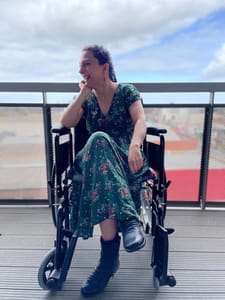by Laura Pettenuzzo

I recently witnessed a white, able-bodied CEO remind her staff that to over a quarter of their peers, disability was not just an abstract concept or a peripheral part of their jobs. Some staff came to work with people with disability and then – shock, horror! – they went home, where they lived with or even, in some cases, cared for, a person with disability.
It didn’t seem to occur to this CEO that many professionals – myself among them – have a far greater understanding of disability because we are, in fact, disabled. It didn’t seem to occur to her that lived expertise is not a qualification earned by mere proximity to members of a marginalized group, nor that the disability community (professional or otherwise) possesses a depth of knowledge, talent and strength that those who live with or care for us cannot possibly share.
If people at the highest levels of leadership, in organisations that purportedly exist to empower disabled people, do not acknowledge us, how then can they expect the broader community to be any better?
I wish I didn’t have to remind this manager and the leaders and organisations designed to support us that being professional, and disabled is possible. But while I do, here’s the memo that she must have missed.
I have been in the workforce – in one capacity or another – for over a decade, and I’ve been disabled since shortly after I was born.
I’m disabled when I log on for work at 9am in the morning, Monday through Friday. I’m disabled when I arrange and attend meetings, when I write and edit and, when I advocate to Ministers and Commissioners and anyone else who’ll care to listen.
My disability is a crucial part of how and why I do the work I do.
I cannot leave my disability at the door, I cannot shrug it off like a cloak the moment the clock hits 5pm, I cannot switch it off along with my laptop.
My legs still spasm on Saturdays, and my mind still worries about every little thing on Sundays.
I am often fatigued, and that doesn’t disappear on Friday evenings. My hips still ache. The aches and fatigue are usually worse on Friday evenings, as my body processes the accumulated demands of each day, and all the ableism I’ve had to deal with that week. That month. That year. My whole damn life.
Mostly, the weight of ableism is present without being debilitating, because I’ve learnt how to manage it, and because there are people who help me carry it.
Earlier this year, I quit my job, and a few days later, one of my coworkers did too. I twirled – literally, awkwardly – around the kitchen once I’d sent off my resignation letter, my joy impossible to contain, and then I called my coworker to celebrate.
‘You’re such an inspiration,’ she told me, and we laughed because we knew there are some people who would say that and mean it.
In the lead up to our resignations, we relied increasingly on humour to get us through, calling each other frequently throughout the day.
We swapped humorous GIFs during staff meetings and my unfettered delight often gave us away. I cannot maintain a poker face and nor, by the time I resigned, did I want to.
The hardest thing about friendships, for me, is when they end. And this one ended far sooner than I would like.
Since going our different ways, we haven’t kept in touch, and the separation wasn’t as difficult as I’d expected. Perhaps I shouldn’t be surprised. I am a professional, after all.
I am in a new job now, for a different disability organisation.
I am forming new friendships with coworkers and finding new allies, people who help me challenge and manage ableism. These bonds, too, are likely ephemeral, and that’s okay.
In this organisation, lived expertise is not only acknowledged but deeply valued.
Acknowledgment and provision of my access needs – and those of others – are a given, not something we have to request or defend.
My colleagues understand that I have the skills and expertise required for my role not in spite of my disability, but precisely because of it.
I am thriving, in spite of the beliefs of the wider ableist society.
I am so much more than stereotypes and misconceptions and low expectations. I am disabled and professional. Mentally ill and reliable. Scared and brave. I wouldn’t have it any other way.

Laura Pettenuzzo (she/her) is a disabled writer living on Wurundjeri country. Her work has appeared in various places, including ABC Everyday, SBS Voices, ArtsHub and Kill Your Darlings. She has a Master of Professional Psychology and works as a plain language and Easy English content writer. Laura is also a member of the Victorian Disability Advisory Council.
Next: The Rising by Ibtisam Shahbaz
or
